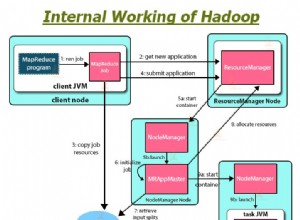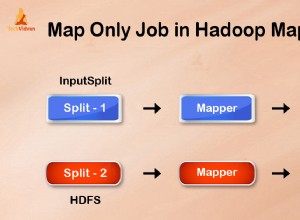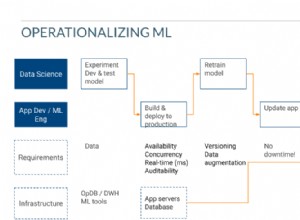En realidad, la otra respuesta es incorrecta. Es posible realizar una búsqueda en un campo DBref dentro de su agregador y no necesita mapreduce para eso.
Solución
db.A.aggregate([
{
$project: {
B_fk: {
$map: {
input: {
$map: {
input:"$bid",
in: {
$arrayElemAt: [{$objectToArray: "$$this"}, 1]
},
}
},
in: "$$this.v"}},
}
},
{
$lookup: {
from:"B",
localField:"B_fk",
foreignField:"_id",
as:"B"
}
}
])
resultado
{
"_id" : ObjectId("59bb79df1e9c00162566f581"),
"B_fk" : null,
"B" : [ ]
},
{
"_id" : ObjectId("582abcd85d2dfa67f44127e1"),
"B_fk" : [
ObjectId("582abcd85d2dfa67f44127e0"),
ObjectId("582abcd85d2dfa67f44127e1")
],
"B" : [
{
"_id" : ObjectId("582abcd85d2dfa67f44127e0"),
"status" : NumberInt("1"),
"seq" : NumberInt("0")
}
]
}
Breve explicación
Recorra los DBRefs con $map, divida cada DBref en una matriz, conserve solo el campo $id, luego elimine el formato k:v con $$this.v, conservando solo el ObjectId y eliminando todo el resto. Ahora puede buscar en el ObjectId.
Explicación paso a paso
Dentro del agregador, un tipo DBRef BSON se puede manejar como un objeto, con dos o tres campos (ref, id y db).
Si lo hace:
db.A.aggregate([
{
$project: {
First_DBref_as_array: {$objectToArray:{$arrayElemAt:["$bid",0]}},
Second_DBref_as_array: {$objectToArray:{$arrayElemAt:["$bid",1]}},
}
},
])
Este es el resultado:
{
"_id" : ObjectId("582abcd85d2dfa67f44127e1"),
"First_DBref_as_array : [
{
"k" : "$ref",
"v" : "B"
},
{
"k" : "$id",
"v" : ObjectId("582abcd85d2dfa67f44127e0")
}
],
"Second_DBref_as_array" : [
{
"k" : "$ref",
"v" : "B"
},
{
"k" : "$id",
"v" : ObjectId("582abcd85d2dfa67f44127e0")
}
]
}
Una vez que haya transformado un dbref en una matriz, puede deshacerse de los campos inútiles consultando solo el valor en el índice 1, así:
db.A.aggregate([
{
$project: {
First_DBref_as_array: {$arrayElemAt: [{$objectToArray:{$arrayElemAt:["$bid",0]}},1]},
Second_DBref_as_array: {$arrayElemAt: [{$objectToArray:{$arrayElemAt:["$bid",0]}},1]},
}
},
])
resultado:
{
"_id" : ObjectId("582abcd85d2dfa67f44127e1"),
"First_DBref_as_array" : {
"k" : "$id",
"v" : ObjectId("582abcd85d2dfa67f44127e0")
},
"Second_DBref_as_array" : {
"k" : "$id",
"v" : ObjectId("582abcd85d2dfa67f44127e0")
}
}
Luego puede llegar finalmente al valor que desea apuntando a "$myvalue.v", así
db.A.aggregate([
{
$project: {
first_DBref_as_array: {$arrayElemAt: [{$objectToArray:{$arrayElemAt:["$bid",0]}},1]},
second_DBref_as_array: {$arrayElemAt: [{$objectToArray:{$arrayElemAt:["$bid",0]}},1]},
}
},
{
$project: {
first_DBref_as_ObjectId: "$first_DBref_as_array.v",
second_DBref_as_ObjectId: "$second_DBref_as_array.v"
}
}
])
resultado:
{
"_id" : ObjectId("582abcd85d2dfa67f44127e1"),
"first_DBref_as_ObjectId" : ObjectId("582abcd85d2dfa67f44127e0"),
"second_DBref_as_ObjectId" : ObjectId("582abcd85d2dfa67f44127e0")
}
Obviamente, en una canalización normal, no necesita todos estos pasos redundantes, usando un $mapa anidado, puede obtener el mismo resultado de una sola vez:
db.A.aggregate([
{
$project: {
B_fk: { $map : {input: { $map: { input:"$bid",
in: { $arrayElemAt: [{$objectToArray: "$$this"}, 1 ]}, } },
in: "$$this.v"}},
}
},
])
resultado:
{
"_id" : ObjectId("582abcd85d2dfa67f44127e1"),
"B_fk" : [
ObjectId("582abcd85d2dfa67f44127e0"),
ObjectId("582abcd85d2dfa67f44127e1")
]
}
Espero que la explicación sea lo suficientemente clara, si no, siéntete libre de preguntar.




